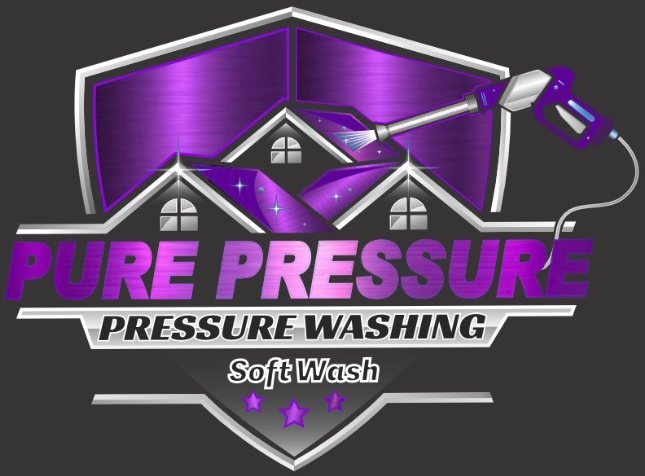Pressure Washing vs Soft Washing
Pure Pressure Exterior Solutions
Pressure Washing vs Soft Washing: Which Is Right for You?
Pure Pressure Exterior Solutions offers expert power and soft washing services to keep your property looking its best. Serving Northeast Texas and Southeastern Oklahoma, our skilled team provides both pressure washing and soft washing to meet your specific needs. But what's the difference, and which method is right for you? Let’s break it down.
Pressure Levels
Power Washing (Pressure Washing): Power washing employs high-pressure water to effectively clean surfaces. The pressure can range from 1,500 to 4,000 PSI (pounds per square inch), depending on the machine and the requirements of the task. This powerful stream of water is highly efficient at removing dirt, grime, mold, mildew, and other stubborn stains from hard surfaces. It is particularly suited for strong, resilient surfaces like concrete, brick, driveways, and stone, all of which can endure high pressure.
Soft Washing: Soft washing utilizes low-pressure water (typically between 300 and 1,000 PSI) in combination with specialized cleaning solutions or detergents. The gentler water pressure ensures it is safe for more delicate surfaces. Soft washing is specifically crafted for materials that may be susceptible to damage from high-pressure water, such as roof shingles, painted wood, vinyl siding, and windows.
Cleaning Agents
Power Washing: Power washing primarily utilizes high-pressure water to cleanse surfaces. In certain instances, detergents or chemicals may be incorporated, particularly for tough stains such as oil or grease. The primary cleaning mechanism relies on the power of the water stream, which effectively dislodges dirt, grime, and debris.
Soft Washing: Soft washing employs a specialized cleaning solution that typically contains bleach, algaecides, surfactants, and other chemical agents designed to break down organic growth, such as mold, algae, and mildew, along with dirt. These solutions are initially applied to surfaces, followed by a rinse with low-pressure water. This technique ensures that contaminants are eradicated at the source, particularly for algae and mold, thereby preventing regrowth.
Surfaces and Applications
Power washing is best for hard, durable surfaces that can withstand high pressure. Surfaces include:
- Concrete (driveways, sidewalks, patios)
- Brick walls and hard surfaces
- Stone and gravel
- Asphalt
- Some types of fences (wood or metal)
- Commercial exteriors and parking lots
Power washing is not recommended for soft or delicate surfaces such as wood, painted areas, or roofs, as it can cause damage or paint chipping.
Soft washing is ideal for delicate surfaces that could be damaged by high-pressure water, including:
- Roofs (shingles, tiles)
- Vinyl or aluminum siding
- Painted surfaces
- Windows (to avoid breakage from high pressure)
- Wooden decks and fences
Soft washing is great for organic growth removal including mold, algae, and mildew. It can often clean surfaces more effectively than power washing because of the chemicals.
Effectiveness
Power Washing: Highly efficient in removing stubborn, built-up grime, dirt, and debris from surfaces such as concrete and stone. The high-pressure water can effectively blast away years of accumulated dirt and stains. However, it may not be as effective in eliminating organic growth like mold or algae compared to soft washing, and improper technique could even push mold spores further into the surface.
Soft Washing: More adept at cleaning organic growth, including mold, mildew, algae, and lichen. The cleaning agents utilized in soft washing not only cleanse the surface but also eradicate the spores, preventing them from returning. Soft washing can yield longer-lasting results in eliminating mold or algae because the chemicals target the root of the issue, rather than merely washing it away temporarily.
Typical Uses
Power Washing:
- Driveways and sidewalks
- Patios and decks
- Building exteriors
- Fleet vehicle cleaning
Soft Washing:
- Roof cleaning
- House siding
- Wooden decks and fences
- Gutter cleaning
Environmental Impact
Power Washing: The intense pressure applied during power washing can lead to the runoff of debris, oils, and dirt into storm drains or nearby water systems, potentially harming the environment if not managed effectively.
Soft Washing: While soft washing can affect the environment because of the chemicals employed—particularly bleach and algaecides—today's soft washing systems aim to minimize chemical waste. Additionally, numerous companies provide eco-friendly cleaning options to lessen their environmental impact.
Conclusion
Power washing is perfect for tough, resilient surfaces requiring a swift, high-pressure clean, such as driveways, concrete, and brick.
In contrast, soft washing is more suitable for fragile surfaces or regions plagued by mold, algae, or mildew, including roofs, vinyl siding, and painted wood. This method delivers a milder, more enduring clean without harming the surface.
Call Pure Pressure Exterior Solutions at (903) 249-9972 for the power or soft washing services you need.
serving Area
Lamar County, TX
Red River County, TX
Choctaw County OK
Fannin County, TX
Hopkins County, TX
Titus County, TX
Hunt County, TX
Grayson County, TX
McCurtain County, OK
Pushmataha County, OK
and surrounding areas
Business Hours
24/7 Emergency Services

Share On: